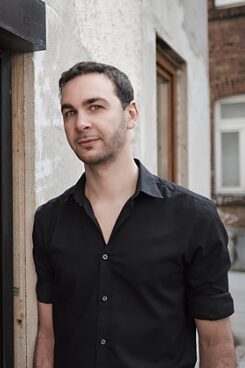The exchange
1. CATHERINE MAVRIKAKIS to PIERRE JARAWAN
Dear Pierre Jarawan,
We do not know each other, but I have just read your book In the End, the Cedars Remain, and already I feel close to you, as if I had entered a world — yours —, and that this access had created intimacy between us. A reader’s dream! After reading only one book, I find myself thinking: Pierre Jarawan... I know him.
It is perhaps to maintain this illusion of closeness that I do not like to meet authors of books that speak to me. I seem to prefer to hold on to the imagined friendship generated by books.
But we are not quite meeting here; I am simply writing you a letter. We are still imagining ourselves in a meeting that has yet to come; we are suspending time... One day perhaps, surely, we will meet, but for the moment I am simply entering the night of your words, repeating them with you.
I write night because it felt to me as though your text was one of darkness, of sleep, or more specifically of storytelling. Even if Lebanon and its sunlight are very present, the narrator is just like his father: he imitates him by sharing his story and that of his fascination for him.
Samir’s father is a great storyteller; he is a magician who amazes children and adults, who invents stories to put them to sleep, or to plant in them a desire that will someday bloom. How to forget a father who dreamed up tales for his son? How to mourn his stories, especially when he disappears one day like a character in a tale?
Your book is akin to Scheherazade, filled with adventures and twists and turns; it is a text of a thousand and one nights and days, a detective story of the child psyche, a discrete essay on immigration. I enjoyed being seduced by these stories perpetually weaving themselves together, these surprising journeys that made us laugh and cry all at once. What could be more romantic than the quest for a father? And yet in your text, fiction is based on Lebanon’s history, its pains and its hopes.
Upon reading you, I thought a great deal about my father, my Greek father who spent his life in Algeria. He came to Canada in 1957 to escape the war. My father who, when he died, gave me permission to write a story too: La ballade d’Ali Baba. Yes, I wrote a story when my father died, a story in which an already grown-up girl meets the ghost of her father who asks to be buried somewhere other than in a cold and sinister Montreal cemetery where the family, without giving it much thought, had already put his body to rest. My father was a man of wanderings and travels. How could I imagine him imprisoned in an urn under a meter of snow? I had to create another resting place for him… In a book.
Meeting the dead or missing father motivated your writing, and I must admit that I was surprised that Samir, as an adult, found the man who had abandoned him in Germany with his mother and sister. This ending was worthy of the greatest tales, and like a child, I applauded their reuniting. Samir needed to understand his father’s life for himself, to stop remembering or building monuments to the dead or missing, as he did in his apartment in Europe. Samir, a child of Germany, was attached to Lebanon like his father, as if the future could not exist for him, imbued with a nostalgia that did not quite belong to him.
Your book depicts with great finesse the impossible mourning of countries “abandoned” by refugees or immigrants. In Germany, Samir’s parents live in a neighbourhood where the Lebanese community is clustered, alive. Your magnificent descriptions of these ties lead us to believe that these exiles were able to remake Lebanon in Germanic lands. I myself suffered greatly from my parents’ nostalgia for Europe and Algeria, which my father did not want to talk about. As a child, I often felt as though I was being thrown into a temporality that was not my own, knowing places that I had never visited. Narratives are powerful... Your book brings the madness of exile to light, and Samir must go to Lebanon for the first time to perhaps mourn what he has not experienced... What a quest.
But I am trying here to reflect on your book, to show how much or how little I understood it. In fact, your book is a tale and through tales, we are blown away, faced with hopes and fears. But above all, we are amazed. Truly, my eyes were filled with wonder…
From my reading of In the End, the Cedars Remain, I retain this awe that you allowed me as a somewhat cynical person, I do confess... I am not at all like my father... I will be diving into A Song for the Missing, which I will read with joy, before writing you again.
In true literary proximity, and in wonder,
Catherine Mavrikakis
2. PIERRE JARAWAN to CATHERINE MAVRIKAKIS
Dear Catherine Mavrikakis,
Thank you for your letter. I must admit, I rarely receive letters, though this may be because I rarely write any. So when I received yours, it was a special moment.
I must admit that I, too, prefer to meet authors through their books. There are countless novels on my shelves whose stories I could tell you with ease, in some cases even with quotes I’ve never forgotten. But if I were asked to tell you who wrote a specific book, I’d have to stop and think and I’d often not remember. This might offend the vanity of some authors, but for me, there’d be no greater compliment than readers remembering my stories instead of my name. I like your idea of friendly bonds through books.
Or through letters. I was very touched to learn how thoroughly you read In the End, the Cedars Remain. Thank you for your words about the book. Maybe you have to be a writer yourself – or a person with a past like yours, a similar past or family history, that is – to realize that the story, though it plays so much in the light, is a story from darkness.
I believe this darkness is familiar to almost every generation whose parents experienced flight or migration. It’s a darkness that comes from idealizing the past, from nostalgia. It’s therefore a darkness that comes from storytelling, storytelling by parents or grandparents, and maybe we, for our part, need to tell stories in order to leave this darkness behind us.
While I was reading your novel, I couldn’t help but wish that I had paid more attention to the Michigan sky when I was there. I was in Dearborn in the spring of 2019. It’s just a two-hour drive to Bay City, the main setting of your novel, so it must have been the same sky.
I was traveling in the U.S. to introduce the English translation of In the End, the Cedars Remain to American readers. There’s a large Lebanese community in Dearborn. I remember the smokestacks and towers of the car factories I saw on the way to the airport, but not the pale purple sky that is so present in your novel.
But perhaps its color is reserved for Amy alone? That’s how I felt while reading your book, which is also a book of colors described to us by a character whose fragility and unreliability you depict brilliantly.
Your book is full of scenes and moments that will become deeply etched in readers’ minds, I’m sure. Oddly enough, the fact that Amy later chooses to become a pilot moved me the most. She’s a relentlessly open person, but she’s most relentless with herself. Her attempt to come closer to the sky she so despises makes her more approachable to me, more human, than anything else she does and says.
What could be more novelistic than a search for a father? I’m referring to the question in your first letter. I think the search for the dark places of the past.
At one point in Der Himmel über Bay City, Amy asks, “What can we do to keep future generations from shattering under the weight of the atrocities?”
Isn’t it amazing that – broadly speaking – we wrote about the same subject and yet we’ve taken such different pathways? I mainly see the thematic connection in Song for the Missing, which you’re reading right now and which I hope you’ll also enjoy.
Today – 30 years after the end of the civil war – there’s a whole generation in Lebanon faced with the question posed by Amy. I think she’s not just asking about family, but also about the functioning, perhaps even the survival, of societies.
I see myself first and foremost as a storyteller. I want to entertain. But I also see my writing as the way to tell stories that counter a silence, without, however, giving in to the illusion that I can really change anything. So maybe it’s selfish writing that seems necessary to me because the silence is unbearable, especially for myself. But maybe it’s the same for Amy? She asks what we can do to keep from shattering. By telling us her story, I think she answers her own question.
Anyway, thank you for your novel. It’s the first novel I’ve read in six months. I’m not proud of taking such a long break from reading, but I may have the best excuse possible: In March, I became the father of twins.
Ever since, I’ve been asking myself how I can best guide my sons in lives in which there’s always someone who will listen to them and who will speak to them; tell them stories that hide nothing. In my own family talking about the past has been the exception rather than the rule, so it’s not something I’ve learned, not something I think I’m particularly good at. I’m going to have to make an effort.
In any case, your novel, the topic you chose for it, and certainly your harrowing approach to it, reminded me how important it is to remember this question again and again.
I’m already looking forward to your second letter.
Warm regards,
Pierre Jarawan
3. CATHERINE MAVRIKAKIS to PIERRE JARAWAN
Dear Pierre Jarawan,
Moved by the infinite melancholy of your book A Song for the Missing, I find myself wanting to dig through a box of old photos. I want to get my hands on an image. I suddenly feel the need to see Cristina’s face.
I remember her stories... Her sister Julieta, a renowned lawyer committed to the defence of human rights, disappeared in Argentina during the 1976 to 1983 military dictatorship. Traumatized by her sister’s fate, Cristina started to disappear from her own friends’ lives. Cristina is a woman who comes and goes without warning. In the midst of travelling, she shows up one evening only to flee unexpectedly, forcing us to feel the absence that she herself experienced in a tragic way.
Ten years have gone by, and Cristina has yet to return unannounced to surprise me. I do not know where she lives, and I cling to the foolish hope of seeing her again. Cristina never had this hope for her sister... And yet, she must have sometimes dreamed of Julieta showing up at her door. Truly, how does one mourn an intangible death, without ritual? In Argentina, more than 60,000 people have suffered this fate, a terribly violent erasure of all existence.
The dead leaving without bodies, without any trace of their absence, is what you manage to describe in your book, which I see as both a gentle lullaby and a magnificent requiem. In German, the title is Lied für die Vermissten, and it seems to me that your text is precisely a lied in the classical sense of the term: a poem sung by a voice, yours, for those who are no longer.
In Lebanon, the number of missing persons is estimated at 17,415. They are almost never mentioned in stories on Lebanon. It is as if, in the face of disappearance, history allows itself to emphasize erasure. As you mention the 17,415 Lebanese who have been engulfed in great collective oblivion, I think of others erased from history, in another corner of the world.
The pains echo, intertwine in my reader’s mind. I am a DJ, mixing Mana’s Los desaparecidos with the voice of Fairuz, whose Lebanese lyrics I cannot properly hum.
Kabul is going through very hard times. Seeing on countless screens people, young and old, trying by any means to leave Afghanistan has revived in me a pain that I better understood after reading your book In the End, the Cedars Remain. The urgency of departure, the mirage it creates, the homeland narrative for those who manage to “get out” and to “rebuild their lives”, as they say, the suffering of exile that goes hand in hand with fear for loved ones who stayed behind, the feeling for generations to come as they carry terrible memories that do not belong to them: this is the future for refugees full of hope.
Today’s Afghanistan is not the Lebanon of yore, of course. A political comparison would be unfortunate, even sacrilegious... But it is the same human journey, the same deep despair and the same hopes for those hurting for their country. It is also the same powerlessness that Western “witnesses” feel. Shame for a rich world that plays with violence from afar...
One day, twenty years from now, in a hospital room in Montreal, I will share a cramped space and my illness with an Afghan woman. She will be old like me, or likely a little younger... I will ask her for her story, first to pass the time and then out of friendship. She will tell me about leaving Kabul, and about her infinite sadness at dying in North America, despite her happiness at witnessing her daughter and son thriving in a country they love as their own.
It will feel as though I am travelling at high speed through an era, living magical moments of metamorphosis in spite of end-of-life stillness. My story will become intertwined with hers, stronger and truer. Kabul will spread in front of me, and with this woman I will relive a world I will have only known through stories told.
Afghanistan will be a celebration she will have imagined for me, and we will laugh about her first birth, her mother being late at her wedding and the madness of living and dying.
Is it not the power of all stories to bring to life pains that are foreign to us? To allow us, wounded by life, to tame these pains, to give them a form that resembles a home? Do books not give us the opportunity to watch over the suffering of others and to provide space for stories to continue to find meaning? As we struggle to close a book, do we not carry the fate of the human condition in its sometimes tragic form?
We know so little of the world’s refugees who flee to rich countries. Sometimes we meet them in a hospital room, at a coffee shop or in the pages of a novel.
Before her death, my mother shared a few nights with a Lebanese woman barely younger than her. I know that in the cold of the nights, she covered my mother with words... My mother died in Montreal and Zahle. I thank those who know how to tell us stories, to lull us to sleep forever.
Catherine
4. PIERRE JARAWAN AN CATHERINE MAVRIKAKIS
Dear Catherine,
I wrote “Munich” in the heading of this letter, but my train is actually leaving the city at this very moment. You were probably traveling, too, when you wrote to me from Nashville. Just as reading your novel took me back to Michigan, this detail reminds me of my reading tour in the United States. It also took me to Nashville. It’s maddening, trying to remember details. My room at the hotel, the arrangement of the shelves at the bookstore where I read, questions from the audience ... but all I recall is that I had barbecue on a street corner there. That’s all.
It’s not Nashville’s fault. I feel this way more and more often, regardless of the places I’ve traveled. They fade. Processes become automated: loudspeaker announcements at train stations, the sterile lighting in airport corridors, baggage carousels, escalators, the exchange of words with cab drivers, check-ins at hotels ... in the German book business, there’s a word for it: Lesereiseneinsamkeit or reading-tour loneliness.
The way these blanks pile up is frustrating to me because there were readings on trips that happened more than 10 years ago where I even remember – or think I remember – the faces of the audience, and know – or think I know – what I was thinking about as I lay sleepless in bed afterwards.
And now, I was in Nashville once in my life and all I remember is the barbecue? This isn’t meant to be a trivial anecdote. What we remember and what we forget and why has always fascinated me. Sometimes forgetting scares me.
It seems to me that the mind of a writer is like a closet with meter-high shelves. As if obsessed, we collect every conceivable fragment so we can later patiently glue them together into a universe that suggests order. This archiving process is automated. It’s not until the moment comes for us to write something down that we remember we filed something there years ago. Underlying this drive, this obsession to preserve everything, is a vague feeling that something is wrong with the world.
So I sometimes feel the compulsion to observe carefully, to look at, and above all to remember everything. So that at some point when I’m writing, a detail flies to me from my memory; a smell, nuances of light, certain glances that I can use.
Is it the same for you? At least the memory you have of Cristina suggests it is. Maybe Cristina is symbolic of memory itself, which comes and goes as it pleases and all we can do is cling to the hope that it will reappear at the right moment.
Cristina’s story is tragic. The void she seems to be circling can probably never be bridged. I remember conversations with relatives of missing persons who told me how for 30 years or more every time they’ve answered the phone or opened the front door they’ve hoped they’ll finally be given certainty. They live lives in which one disappointment follows another.
In your letter, you write about the power of all stories to make us empathize with strangers’ pain. And about how reading books can make us bearers of human destiny. I agree with you.
Something is wrong with the world. Maybe that’s why the order I find in novels gives me a sense of security. To me, stories and books are places of refuge to this day. As far back as I can remember, I’ve always lived in and with them. As an experienced reader, I know that good stories adhere to certain structures that offer orientation. Their world-ordering function gives me security. Exposition. Details. Climax. Disaster. It’s hard to get lost in it. Maybe writing is nothing more than our subconscious attempt to sort out a world that’s gone off the rails.
You also mentioned Montreal, which reminds me of another thing: The city in May. I was able to look down on the city from Mont Royal one evening. Only a few clouds, as if hatched in pencil, were in the sky, which gradually condensed into a deep blue, the red of the evening sun running through it like veins or tiny rivers. I tried to see Hotel 10 on Sherbrooke Street from up there where I was staying, but failed. It was one of my last stops before traveling back to Germany and now that I think back on it, I’m glad I preserved this and other details of the city.
Maybe I’ll be able to return to Montreal someday and maybe then we can meet in person. I hope so.
Pierre
Catherine Mavrikakis (Quebec)
 Catherine Mavrikakis
| © Sandra Lachance
Catherine Mavrikakis was born in Chicago in 1961, and is a Quebec writer and essayist. She has published eight novels, including La ballade d’Ali Baba, Les derniers jours de Smokey Nelson, Le ciel de Bay City, Oscar de Profundis and L’Annexe and is the author of an oratorio, Omaha Beach. She also writes essays, including Diamanda Galás, Guerrière et gorgone and L’éternité en accéléré. Her books have been translated into several languages and have won numerous awards, including the Prix des libraires du Québec and the Prix littéraire des collégiens.
Catherine Mavrikakis
| © Sandra Lachance
Catherine Mavrikakis was born in Chicago in 1961, and is a Quebec writer and essayist. She has published eight novels, including La ballade d’Ali Baba, Les derniers jours de Smokey Nelson, Le ciel de Bay City, Oscar de Profundis and L’Annexe and is the author of an oratorio, Omaha Beach. She also writes essays, including Diamanda Galás, Guerrière et gorgone and L’éternité en accéléré. Her books have been translated into several languages and have won numerous awards, including the Prix des libraires du Québec and the Prix littéraire des collégiens.
Pierre Jarawan (Germany)
Pierre Jarawan was born in 1985 to a Lebanese father and a German Pierre Jarawan
| © Marvin Ruppert
mother and moved to Germany with his family at the age of three. Inspired by his father’s imaginative bedtime stories, he started writing at the age of thirteen. He has won international prizes as a slam poet, and in 2016 was named Literature Star of the Year by the daily newspaper Abendzeitung. Jarawan received a literary scholarship from the City of Munich (the Bayerischer Kunstförderpreis) for The Storyteller, which went on to become a bestseller and booksellers’ favorite in Germany, the Netherlands, France, and Brazil. Song for the Missing is his second novel.
Pierre Jarawan
| © Marvin Ruppert
mother and moved to Germany with his family at the age of three. Inspired by his father’s imaginative bedtime stories, he started writing at the age of thirteen. He has won international prizes as a slam poet, and in 2016 was named Literature Star of the Year by the daily newspaper Abendzeitung. Jarawan received a literary scholarship from the City of Munich (the Bayerischer Kunstförderpreis) for The Storyteller, which went on to become a bestseller and booksellers’ favorite in Germany, the Netherlands, France, and Brazil. Song for the Missing is his second novel.


